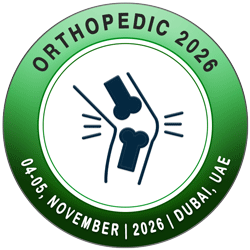Track: Neurology and Orthopedic surgery

Neurology and orthopedic surgery are distinct medical specialties that frequently intersect, particularly in diagnosing and treating conditions affecting the musculoskeletal and nervous systems. This collaboration has given rise to the field of neuro-orthopaedics, which focuses on managing musculoskeletal disorders resulting from central and peripheral nervous system lesions. Orthopedic neurology is a subspecialty that focuses on conditions where the nervous and musculoskeletal systems overlap. This includes diagnosing and treating injuries related to the brain, spinal cord, nerves, and muscles. For instance, a back injury sustained during sports may affect both the spinal cord and the surrounding musculature, necessitating a combined neurological and orthopedic approach for effective treatment.
Key Topics and Highlights:
• Spinal Cord Injuries and surgery
• Cerebral Palsy
• Peripheral Nerve injuries and surgery
• Surgical Interventions
• Spinal Stenosis
• Non-Surgical Treatments
• Brain surgery
• Discectomy
• Laminectomy
• Artificial disc replacement
• Spinal fusion
• Gait Abnormalities
• Anterior cervical discectomy and fusion
• Spinal disc herniation
• Minimally invasive spine surgery
• Spasticity and Muscle Contractures
• Peripheral nerve Neurosurgery
• Joint Deformities
• Rehabilitation Programs
• Spinal stenosis
• Arteriovenous malformation
• Craniotomy
• Foot Drop
• Spinal decompression
Summary:
The integration of neurology and orthopedic surgery into the specialized field of neuro-orthopaedics underscores the significance of a multidisciplinary approach in managing complex conditions. By combining expertise from both specialties, healthcare providers can offer comprehensive care tailored to the unique needs of patients with overlapping neurological and musculoskeletal disorders.
Scientific Highlights
- Orthopedic Surgery
- Orthopedics and Sports medicine
- Orthopedics and Arthroscopy
- Orthopedic Physiotherapy
- AI and Robotics in Orthopedics
- Arthritis: Types, Diagnosis and Treatment
- Arthoplasty and Oncology
- Musculoskeletal Disorders, Medical and Clinical Trials
- Rheumatology and Arthritis
- Foot & Ankle Surgery
- Spine Disorders and Surgery
- Physical Medicine and Rehabilitation
- Neurology and Orthopedic surgery
- Orthopedic Radiology
- Orthopedics and Osteoporosis
- Other Orthopedic Trauma: Surgery and Conditions


